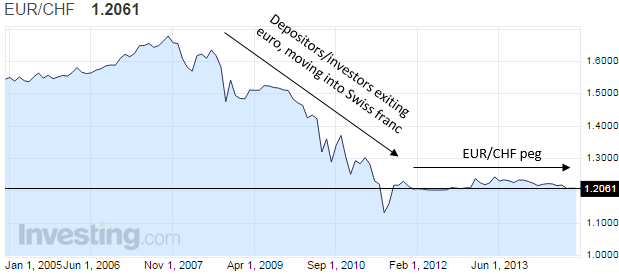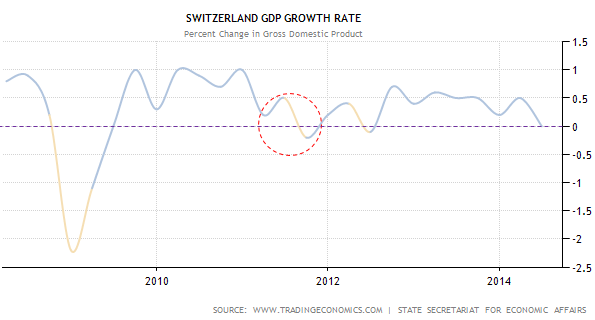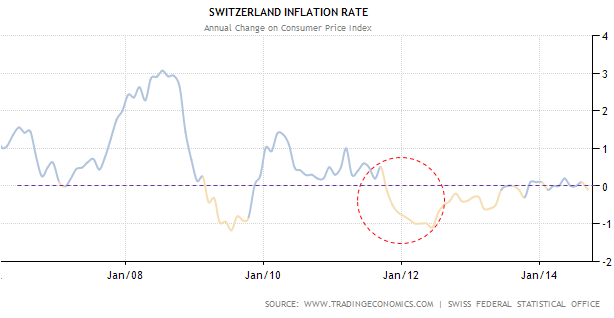This is every gold bull's dream. The Swiss just might force their central bank to begin accumulating massive amounts of gold via the so-called "Save our Swiss gold" referendum. The Swiss National Bank (SNB) unwound a large portion of its gold holdings prior to the financial crisis and now it could be forced to buy it back over the next five years. Here is what the accumulation is likely to look like assuming the rest of the balance sheet stays constant.
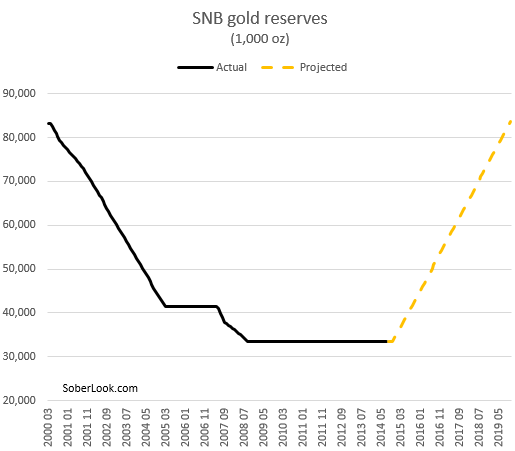 |
If the proposal passes in November, the SNB will also need to repatriate its physical gold holdings stored abroad (particularly in the US and the UK) back to Switzerland. The most difficult part of the law is that once the SNB buys any gold, it would no longer be permitted to sell the holdings at any time.
The law would require the SNB to hold at least 20% of its assets in gold (from less than 8% currently), likely forcing the central bank to unwind some of its foreign reserves.
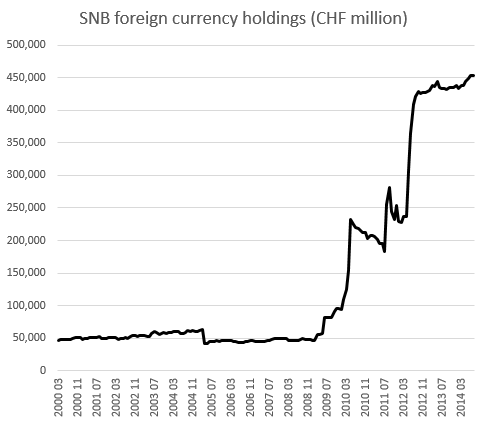 |
To understand why the SNB would need to sell its FX reserves, let's start with a bit of background. The reason the SNB's foreign reserves are so elevated is to a large extent the result of the 2008 financial crisis and more importantly the Eurozone crisis. Since the default of Lehman and through the euro area debt turbulence, depositors/investors moved assets out of the Eurozone into Switzerland. They feared a potential collapse of EMU banks, haircuts on euro-denominated deposits (which is what ultimately happened in Cyprus), and even the breakup of the euro - followed by redenomination back to pre-euro currencies and devaluation of the lira, drachma, escudo, etc.
Many moved assets to the relative safety and independence of the Swiss franc, which resulted in Swiss currency's sharp appreciation against the euro (the chart below shows the euro depreciating against the franc).
The currency spike made Swiss products/services much more expensive in the Eurozone, driving Switzerland toward recession.
Moreover, the currency strength had generated deflation in Switzerland that was as severe as what we saw right after the financial crisis.
The Swiss National bank had to arrest the franc's appreciation, which it did by imposing a currency peg to the euro. But in order to maintain the peg while everyone wanted to buy the Swiss franc, the SNB was forced to do the opposite - sell the franc and buy the euro. That's why the SNB foreign reserves spiked during the eurozone crisis (see post from 2012) - with nearly half the reserves in euro.
Now back to the situation with the SNB's gold holdings. It's unlikely that the SNB would use Swiss francs to buy gold if forced to do so. That's because the SNB would need to "print" the currency (similarly to the Fed buying treasuries via QE), which would result in the central bank's balance sheet expanding. But gold reserves would have to stay at 20% of total assets, forcing the SNB to buy more gold than planned due to larger balance sheet.
That means the central bank would need to sell something and replace it with gold in order to avoid unwanted balance sheet expansion. The SNB is therefore likely to sell foreign currencies, particularly the euro. And that could potentially put pressure on the EUR/CHF peg discussed above by weakening the euro.
Furthermore, if there is another "run on the euro" and the SNB is forced to defend the peg by buying more euros, the central bank would be also forced to buy more gold (by selling the euros). Such downward pressure on the euro is actually quite possible, should the ECB embark on a new QE effort on order to arrest disinflationary pressures.
In such a situation, large market participants would simply go long gold while shorting massive amounts of euro against the Swiss franc (possibly via options). If the SNB buys a great deal of euros to keep the peg fixed, it would also be forced to buy gold. In such a scenario the traders win on the gold appreciation. If the SNB gives up the peg and no longer buys gold, the euro falls sharply against the franc and the traders win - again. The peg becomes unsustainable.
The "Save our Swiss gold" initiative is therefore simply incompatible with the longer term EUR/CHF stability objectives.
Over the long run, the inability to sell any gold could in theory force the SNB's balance sheet to be 100% gold. If the central bank assets for example grow to 5 times the current size (with the 20% rule in place), and then shrink back to their original size, the Swiss National Bank would be holding nothing but gold. It would no longer have the ability to do much of anything, especially address deflationary pressures.
What's the likelihood that the "Save our Swiss gold" proposal passes? According to the GFS Bern poll for the November 30th referendum, 44% of respondents currently support it, 39% are against it and 17% are not yet decided. This is obviously too close to call, but the possibility of a "yes" vote is now quite real.

